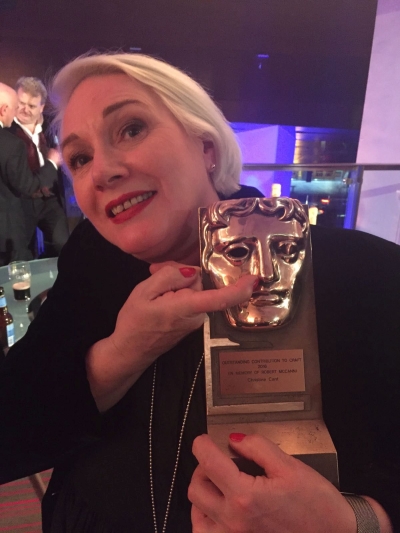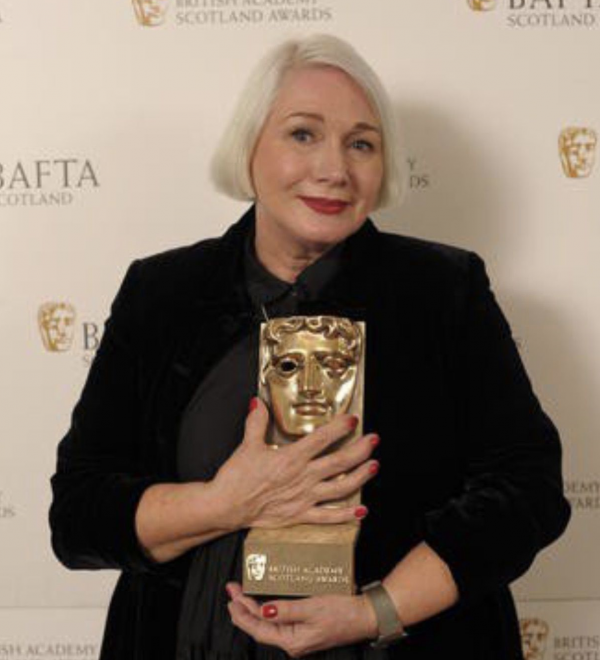Interview with Make up Designer, Christine Cant
Christine Cant is a multi-award winning Make-up Designer, who has worked on shows such as Father Ted, Absolutely Fabulous, The Mighty Boosh and Brass Eye.
thecallsheet.co.uk asked her about her career and tips for aspiring artists.
Feb 2017
What have you been working on recently?
The most recent production I worked on was season 19 of Midsomer Murders which finished mid-November. It was interesting for me to come into something so long established.
You were awarded an Outstanding Contribution BAFTA at the end of 2016, did you know you were going to be honoured?
BAFTA got in touch a few weeks before the ceremony because they wanted to do a little montage of some of my characters and talk to a few people who had worked with me.
It was all very flattering!! I had a brilliant time, caught up with lots of old friends and it was a joy to go back to Glasgow to receive the award. I'd love to go back to Scotland to work, I miss it.
The strange thing is however, awards seem to be double-edged swords. I have a few now and I've noticed that each time I get an award the telephone goes strangely quiet afterwards. Could be coincidental but my theory is that folk presume I must be inundated with work or I'll be too grand or expensive to want to work on their production. I'm not! Just ask me.
When did you first get interested in makeup and what steps did you take to make a career out of it?
It seems like I've always been interested in ways of altering the way people look.
I had very bad acne when I was young so I started by covering my spots with makeup, then why stop there?!
I went to Glasgow Art School where I did painting and found that I liked to paint and draw people more than anything else. Make-up became a way to do that in 3 dimensions and it was the 70's - look at Bowie and Roxy Music and T Rex for example - people were pushing it with makeup it was a stimulating time. After art school I taught art for a wee while then I was a medical illustrator, not really feeling entirely committed to either of those but , unlike now when we have many independent makeup schools and courses and ways to learn and get into make-up, the only way to do it then was to get a job with either the BBC or ITV ( yes, that was it - imagine only having two television channels!) or, if you were driven enough or fortunate to know someone in the film industry you could be a trainee on a film.
I have never been particularly ' driven'. I think it's that old fear of failure/ being found out / imposter syndrome so I was very fortunate to succeed in my interview for a job with BBC Scotland as trainee make up assistant. The training came with the job! Imagine having a permanent position with holiday, pension, kit provided and the best makeup education available at the time- that's the stuff of dreams in today's climate.
Can you recall any breakthrough moments or mentors that helped you establish yourself?
I think the breakthrough moment for me was one week into my training at the BBC training school in Woodstock Grove, Shepherds Bush. We were a class of mostly arts graduates. Annie Hole, our main tutor was retiring after our course and had succeeded in persuading the powers to indulge her in her belief that people with arts backgrounds made the best makeup artists (no disrespect to people who have other starting points) and 10 out of the 12 of us had been to art school. Perhaps to test our metal or to make up for our lack of hair experience, we started with finger waves and marcel waves. I'd never felt so cack-handed in my life but I'd burned my bridges and felt there was no way back so I dug in and realised that hair was just another medium, to be manipulated, bent into shape, cut, teased, coloured to whatever ends I wanted - it was just sculpture. That was a revelation! I could already paint so makeup was something I understood and now I had another tool. I've loved it since.
I was extremely lucky to go back to BBC Scotland after the school as it was a relatively small department in comparison to Television Centre and I was thrown right in at the deep end as a productive member of the department, making up principal artists before I had time to forget what I'd just learned. It felt natural and exciting. Also there was a busy film drama department doing many period dramas and a healthy comedy unit so period hair/ wigs, bald caps and false noses were everyday work. No time to lose confidence, just get on with it. So lucky!
 What are the must have items in your kit?
What are the must have items in your kit?
My brushes.
Makeup gets used up, goes out of date or gets discontinued, electric items wear out, become obsolete, tools also get worn out, break, wigs get tired ( though I do have some fairly useful ancient ones)
But my brushes are pretty constant. I have a brush that was in my kit when I started at the BBC all those years ago- it's 36 years old, slightly eroded but sill doing the job.
You've designed some of the most iconic comedy series in the last 20 years, including Brass Eye, Father Ted and Alan Partridge. What are your favourite moments from those shows?
I have the opportunity to have a right laugh at work. Some of the funniest things aren't the gags in the shows but the situations you find yourself in while making them. Just downright weirdness!
Coming down very early in the morning to go and film on Brass Eye to find my sitting room filled with fax paper (...it was that long ago!). Chris had been up all night writing and sent a script through. We filmed a lion, in a room with the film crew- its roar shook the walls and it had very bad breath.
Father Ted = mud and hot Irish whisky. I was particularly fond of the hairy priests and then all the Mrs Doyle multiples, cheering the football match and trying to get into the parochial house to mob the singer Eoin McLove who '....has no willy'.
I can't really claim any real creative input for Partridge, I did the 2nd series but one of the abiding images is of a bunch of S/As ( farmers?) chucking a dead cow off a bridge over the Thames onto a boat that 'Alan' was on.
What is the most under recognised aspect of what a designer does?
Possibly the extent of the psychotherapy conducted in the makeup chair.
Noel Fielding said that they would work their schedule around your availability on the Mighty Boosh as you were so central to the show - can you describe the collaborative between you and the Boosh?
It was a relatively luxurious process! I was given plenty of prep time and access to the guys whenever I needed to ask questions- lots of questions about some of those characters.
Noel would draw or paint what he would like them to look like and I had the time to try a number of things before we reached the final character. Often things that look good in a painting won't work in 3 dimensions. For example, I'm lucky enough to have the original 'Crack Fox' painting but he looks very little like the evil little runt that we made Julian into for the show - except for the syringe fingers. I often think I spent most of my makeup budget in B&Q on that one.
You're working on more drama shows at the moment - what are the challenges to the longer format drama?
It's a bit of a misconception that I only do comedy. My first BAFTA was for the first series of 'Hercule Poirot's Casebook''. Perhaps it's just that the others weren't that notable.
I absolutely don't find a longer format challenging- you have time to get into your stride whereas with many of the comedy productions I've worked on you can have hundreds of characters - it was around 200 on Harry and Paul's history of BBC2 and that was just a one episode show with perhaps 8 actors!
That's a challenge!
What's been your favourite day at work?
Too many to choose from!! Do you know how lucky I've been, the people I've met, the places I've seen?
What advice would you give to someone interested in getting into makeup?
Don't start too young. Live some life first, learn some stuff, get your hands dirty. Then you will be equipped to deal with the vagaries, uncertainties and the long, long days of a makeup artist.
If you're looking for glamour and the high life- forget it. It's hard work this job, you need guts and stamina.
Look hard at people, imagine why they look the way they look. Be cool but warm- never panic. ( not at work anyway!) Don't specialise before you've learned all the aspects of the job. Read. Breaking down and understanding scripts is part of the job. Buy me a drink in the pub - I might take you on as a trainee!
Members can view Christine's profile page and contact details on thecallsheet.co.uk here
